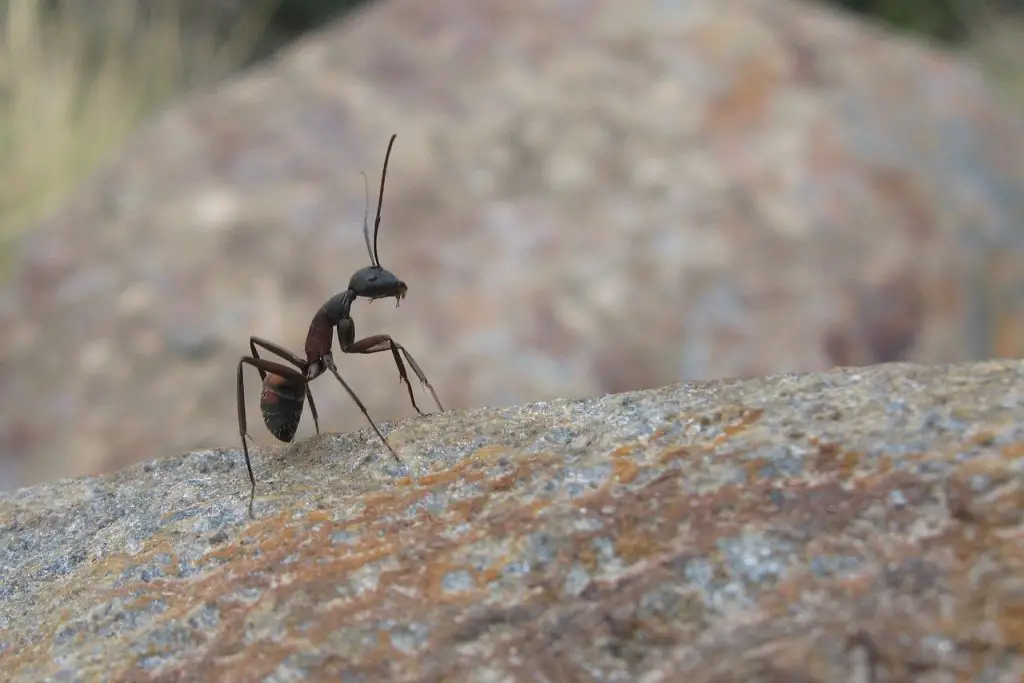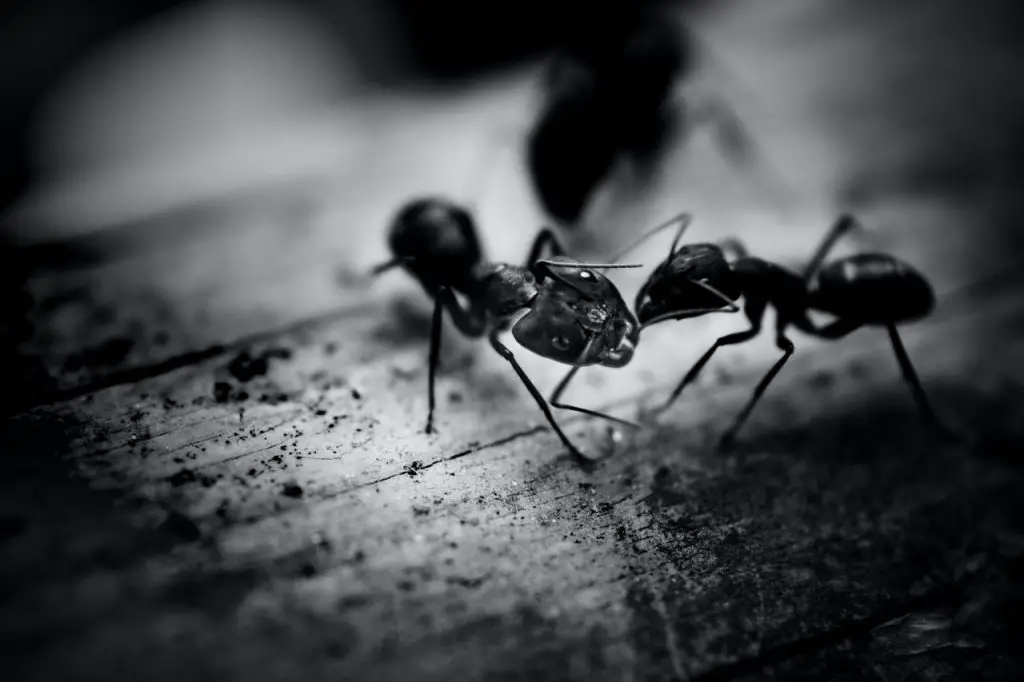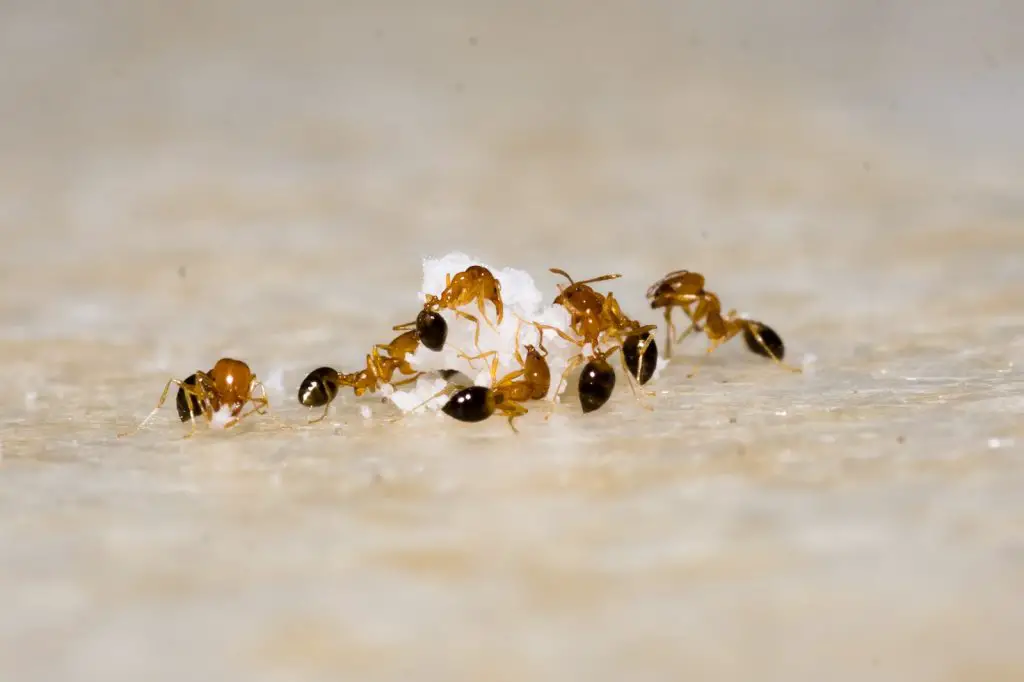Ants are among the most persistent and annoying household pests, and homeowners are always on the lookout for effective ways to get rid of them.
Bleach has been touted by some as a surefire solution to this problem, but the efficacy of using bleach as an insecticide has been called into question.
Are you ready to uncover the surprising truth about whether bleach is an effective solution for eliminating ants? Let’s dive deeper and discover what the experts have to say!”
What Is Bleach and How Does It Work?
Bleach is a strong chemical solution that is commonly used as a disinfectant, stain remover, and whitening agent.
The active ingredient in bleach is typically sodium hypochlorite, a compound of chlorine, sodium, and oxygen. Household bleach usually contains 5% to 8.25% sodium hypochlorite, although this amount may vary
What makes bleach such a powerful cleaning agent?
Bleach’s power as a cleaning agent comes from its ability to break down and destroy proteins and enzymes that make up the cells of bacteria and viruses.
When bleach is mixed with water, it produces hypochlorous acid, which is the active ingredient responsible for its germicidal properties. Hypochlorous acid can break down and destroy organic matter, including microorganisms like bacteria and viruses.
Bleach is an effective disinfectant and cleaning agent that can also oxidize stains and whiten surfaces.
Can Bleach Kill Ants?
Bleach can be effective in killing ants on contact due to its strong oxidizing properties.
Bleach is a powerful disinfectant that is commonly used for cleaning and sanitizing surfaces. However, while bleach may be a quick solution for getting rid of ants, it may not be the best long-term strategy.
Using bleach to kill ants can be harmful to both humans and pets, as well as the environment. Bleach contains harsh chemicals that can cause skin irritation, respiratory problems, and even chemical burns if not handled properly.
Bleach can be effective in killing individual ants, but it may not be able to eliminate an entire ant colony. In fact, using bleach can disrupt the ant’s pheromone trails, causing them to scatter and form new colonies elsewhere in your home.

How to Safely Use Bleach as an Ant Killer?
When using bleach, it’s important to take the following safety precautions:
- Wear protective gloves and eyewear when handling bleach.
- Dilute the bleach with water according to the instructions on the label.
- Apply the bleach solution directly to the ant-infested areas using a spray bottle or a sponge.
- Keep children and pets away from the treated area until the bleach has completely dried.
- Ventilate the area by opening windows or using fans to help dissipate the bleach fumes.
- Follow up with a thorough cleaning of the treated area to remove any remaining bleach residue.
- Consider using alternative natural or chemical methods to get rid of ants if you have concerns about using bleach.
Alternative Natural and Chemical Methods to Get Rid of Ants
- Vinegar: Mix equal parts vinegar and water in a spray bottle and spray it on ant trails, entry points, and nests.
- Cinnamon: Sprinkle the cinnamon powder in areas where ants are present, or mix it with water to create a spray.
- Diatomaceous Earth: This natural powder can be sprinkled in areas where ants are present, and it works by dehydrating and killing them.
- Borax: Mix borax with sugar and water to create a bait that ants will take back to their nest, ultimately killing the colony.
- Lemon Juice: Mix equal parts lemon juice and water in a spray bottle and use it on ant trails and entry points.
- Peppermint Oil: Mix a few drops of peppermint oil with water in a spray bottle and spray it on ant trails and entry points.
- Baking Soda and Powdered Sugar: Mix equal parts baking soda and powdered sugar and sprinkle it in areas where ants are present. The sugar will attract them, and the baking soda will kill ants.
- Insecticides: If natural remedies don’t work, you can use insecticides to get rid of ants. Be sure to follow the instructions carefully and keep them away from children and pets.
Pros and Cons of Using Bleach as an Ant Killer
Here are the pros and cons of using bleach as an ant killer:
Pros of using bleach as an ant killer
- Effective: Bleach can be effective in killing individual ants and disinfecting surfaces.
- Easily available: Bleach is readily available and affordable.
- Versatile: Bleach can be used for a variety of cleaning and disinfecting purposes, making it a multi-purpose household cleaner.
Cons of using bleach as an ant killer
- Harmful to humans and pets: Bleach contains harsh chemicals that can cause skin irritation, respiratory problems, and even chemical burns if not handled properly. It can also be harmful to pets and the environment.
- May not eliminate entire colonies: Using bleach may disrupt the ants’ pheromone trails, causing them to scatter and form new colonies elsewhere in your home.
- Can damage surfaces: Bleach can be corrosive and damage surfaces if not used properly, leading to discoloration or even structural damage.
Does Bleach Kills Red Ants?
Bleach can kill red ants, but it may not be the most effective method of ant control. While bleach can kill ants on contact, it does not have a long-lasting effect on their colony or the ant’s nest.
Does Bleach Kills Carpenter Ants?
Bleach can kill individual carpenter ants on contact, but it is unlikely to be an effective method of controlling a carpenter’s ant infestation. Carpenter ants build their nests deep within the wood, making it difficult for bleach to reach and eliminate the entire colony.
Carpenter ants can cause significant damage to wooden structures and should be dealt with promptly and effectively.
Does Bleach Kill Flying Ants?
Bleach can take care of individual flying ants. However, if you’re dealing with a whole colony, it’s not that easy to eliminate them completely. Those pesky critters can be quite persistent.
When bleach comes into direct contact with the flying ant, it can break down the cuticle, causing the ant to lose water rapidly through its exoskeleton. This leads to dehydration and eventually death. The bleach also damages the ant’s respiratory system, making it difficult for the ant to breathe.
The exoskeleton of an ant is composed of chitin, a tough polysaccharide that provides structural support and protection. The exoskeleton is also coated with a waxy layer called the cuticle, which helps to prevent water loss and protect against pathogens and environmental toxins.
Conclusion
Bleach can kill ants due to its strong oxidizing properties, but it may get rid of the whole colony and can make them move to other parts of your home.
Alternatives include natural methods like vinegar, cinnamon, and diatomaceous earth, as well as chemical insecticides. Bleach can also damage surfaces if not used properly.
Bleach is harmful to the environment, humans, and insects because it is a highly corrosive and toxic substance. When bleach is used in large quantities, it can cause harm to aquatic life by disrupting the natural balance of water ecosystems.
Bleach can release harmful fumes into the air, which can cause respiratory problems in humans and animals.



